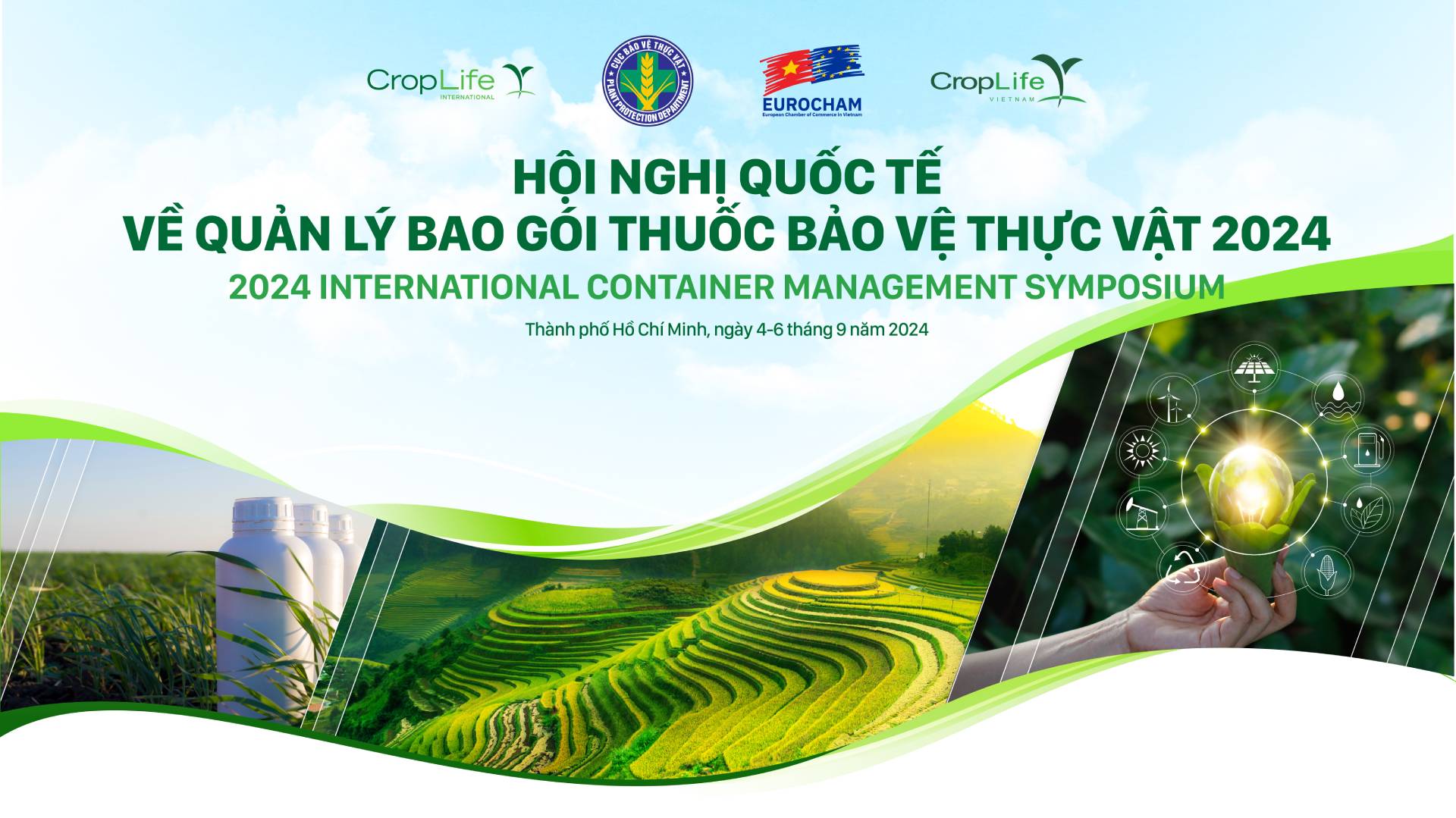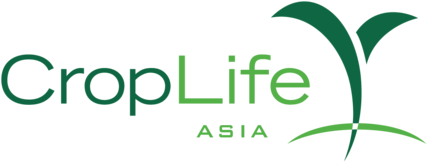Global Experts Share and Discuss Best Practices in Managing Crop Protection Containers Towards Sustainability and Circular Economy
CropLife International (CLI) in collaboration with the Plant Protection Department (PPD) of Vietnam’s Ministry of Agriculture and Rural Development (MARD), European Chamber of Commerce in Vietnam (EuroCham), and CropLife Vietnam (CLV) has inaugurated the 2024 International Container Management Symposium (CMS 2024)
Global Experts Share and Discuss Best Practices in Managing Crop Protection Containers Towards Sustainability and Circular Economy


Hochiminh City, Vietnam – 4 September 2024 – CropLife International (CLI) in collaboration with the Plant Protection Department (PPD) of Vietnam’s Ministry of Agriculture and Rural Development (MARD), European Chamber of Commerce in Vietnam (EuroCham), and CropLife Vietnam (CLV) has inaugurated the 2024 International Container Management Symposium (CMS 2024). The event has gathered leading international experts in container management, aiming to create a useful forum and promote knowledge-sharing on increased effectiveness and efficiency in container management systems – including empty pesticide containers, and other agricultural plastic management. The symposium lasts for 3 days, from 4th to 6th of September, and covers a range of sessions and topics on container management, including policy and management approaches of such activities implemented globally, with a focus on Asia and Vietnam.
Opening the conference, Mr. Huynh Tan Dat – Director General of PPD expressed: "PPD highly appreciates the vision of this conference, especially in emphasizing the importance of strengthening cooperation and shared responsibility of all stakeholders to promote sustainable practices for collecting and magaging empty pesticide containers. This marks an important step to ensure the responsible production management follows the life cycle approach of our industry. From a management perspective, we also hope that experts at the conference will share more experience and mechanisms for managing post-use pesticide containers in other countries, so that we can continue to provide guidance and deploy appropriate management mechanism in Vietnam, towards the ongoing goal of sustainable and circular agricultural development of our nation."
Also at the symposium, Dr. Andrew Ward – Stewardship Director of CLI emphasizes: “CropLife Associations and Member Companies have been at the forefront of agricultural plastics management through establishing Container Management Systems in over 60 countries. Many of these have grown to include other farm waste as well. This demonstrates the effectiveness of risk management but also has environmental benefits, particularly where the containers are recycled into specific plastic products. We believe that bringing together the global community in this Symposium in Vietnam will provide a catalyst to further advances in this sector and is a Symposium for a range of stakeholders.”
Following Andrew’s remarks, Dr. Siang Hee Tan – Executive Director of CropLife Asia attached great importance to legal obligations that can enable and enhance the successful implementation of container management programs, especially in Asian countries: “The need for clear and proportionate regulations with container management based on the shared responsibility of all concerned stakeholders is more critical than ever. All container value chain stakeholders have a responsibility with product end-of-life (e.g., EPR) and to ensure a level playing field among producers and importers alike. CropLife Asia also recommends the mandatory take-back requirement for retailers and distributors as well as rinsing and return requirements for product users.”
At the conference, Mr. Dang Van Bao - Chairman of CropLife Vietnam said: "In recent years, CropLife Vietnam has implemented long-term collaboration with PPD-MARD and industry partners to deploy pilot stewardship models in key agricultural production areas such as Son La and Dong Thap; in which, training on container management for farmer is an integral part. By providing on-field guidelines for farmers to handle empty containers, setting up collection tanks and organizing many containers collection campaigns, we hope to gradually change farmers' behaviour of CP use. Our members also support, actively participate and contribute to the EPR fund with the desire to create more sustainable funding mechanisms to streamline CP container management systems in particular, and agricultural waste management in general, throughout Vietnam in a systematic and long-term manner. Besides, we are also constantly researching innovations in pesticide packaging, using materials that are safe and suitable for Vietnamese farming conditions. This is one amongst our concrete examples which demonstrates our lifelong commitment to product lifecycle management.”
According to Mr. Jean-Jacques Bouflet, Vice Chairman of EuroCham Vietnam, “EuroCham has been actively promoting sustainable practices in Vietnam, including hosting the Green Economy Forum and Exhibition in 2022 and planning its return in October 2024. These key events are instrumental in discussing the future of sustainability and enhancing our impact. We are committed to supporting Vietnam's vision for a sustainable future, particularly in agriculture. Sustainable agriculture is crucial for food security, environmental protection, and economic growth, and EuroCham is ready to collaborate with the government, our members, and stakeholders to address the challenges of agricultural plastic waste management.”
This year’s international conference brings together more than 50 leading international experts in pesticide packaging management, along with representatives of pesticide management units and pesticide associations in Vietnam and other Southeast Asian countries. Experts will discuss different aspects of post-use pesticide packaging management, specifically:
- The first day of the conference addresses issues related to Pesticide Packaging Management in Vietnam and in the Asian region. In the session, a range of factors in successful establishment of pesticide packaging management systems in regions such as Europe, North America, Latin America, Africa - Middle East are discussed, together with some specific pilot programs in some countries such as China, India, Malaysia, Indonesia and Vietnam.
- Day 2 concentrates on two major issues related to Pesticide Packaging Management: (1) Updates on the implementation of the EPR (Extended Producer Responsibility) mechanism for management activities pesticide packaging, and (2) Application of advanced technologies to training, communication, and scale-up of packaging management activities across different countries. On this day, representatives of the Vietnam’s National EPR Office also introduces EPR regulations and supporting mechanisms for packaging management programs in the country. Symposium participants also discuss the opportunities and implications for pesticide packaging management in the future.
- The third day of the Conference consists of two activities. In the morning, experts continue to share international agreements on pesticide packaging management and provoke discussions on plastic management in agriculture. In the afternoon, delegates pay avisit to a model of collection and packaging processing at a farm certified with Global G.A.P standards for export to the European market.
CMS is a stewardship initative of CropLIfe International, with the first Symposium organized in Beijing in 2018 and the second edition in Shanghai (China) in 2019. This initiative resumes in 2024 in Vietnam, displaying the plant protection industry’s commitmentto product end-of-life management, including promoting responsible and sound management of packaging waste in all markets for all professional users. Since 2005, the global CropLife network container management programs collect and recycle empty pesticide containers in more than 60 countries around the world, with total volume of packaging collected of more than 1.4 million metric tons up to 2022.
####
About CropLife International
As a global voice and leading advocate for the plant science industry, we champion innovative technologies that help farmers grow more food on less land sustainably. We represent six of the world’s leading multinational R&D companies in the plant science sector by protecting intellectual property to foster a culture of innovation, advocating for trade and regulatory policies that facilitate access to new technologies, and ensuring the responsible and effective use of plant science innovations.
About CropLife Vietnam
CropLife Vietnam is a non-profit association under CropLife Asia and CropLife International - representing the voice of the plant science industry. In Vietnam, CropLife and its 10 member companies (Adama, BASF, Bayer Crop Science, Corteva AgriScience, FMC, Nufarm, Sumitomo Chemical, Summit Agro, Syngenta and UPL) are always committed to supporting and implementing long-term strategies to help 25 million farmers effectively apply scientific solutions in agricultural cultivation to promote growth, improve crop productivity, and create high-quality agricultural products while minimizing negative impacts. onto the environment. More information about CropLife Vietnam can be found at More information about the Association, visit www.croplifevietnam.org.
About EuroCham
Founded in 1998, the European Chamber of Commerce in Vietnam (EuroCham) has established itself as the unified voice of the European business community in Vietnam. With offices in Hanoi and Ho Chi Minh City, we represent a diverse spectrum of 1,400 companies, ranging from small and medium-sized enterprises to multinational corporations. EuroCham plays a crucial role in shaping policy dialogues, fostering bilateral trade and investment, and fortifying economic ties between Europe and Vietnam, particularly within the framework of the EU-Vietnam Free Trade Agreement (EVFTA).
Media Contact
Vinh Dao – CropLife Vietnam Coordinator – Email: vinh.dao@croplifevietnam.org
